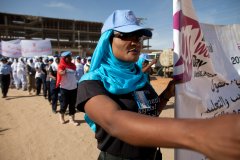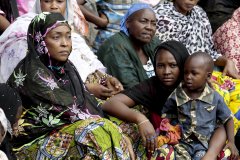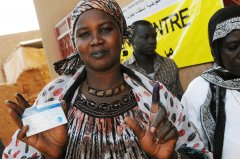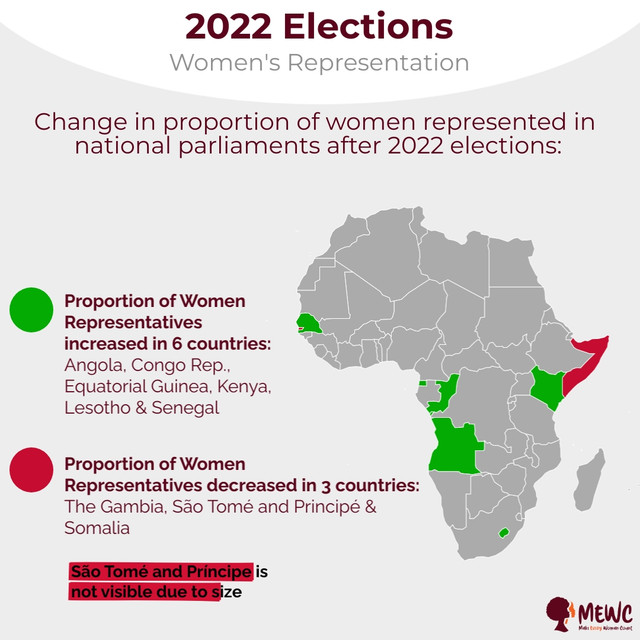Gender Issues Showlist
Women, Peace & Security
UNSCR 1325 calls on all parties to: protect and respect the rights of women and girls in conflict & post-conflict; increase women participation in all conflict resolution, peacekeeping and peace-building & to end impunity by prosecuting perpetrators of sexual and other violence on women and girls
index.php?option=com_content&view=category&id=56&Itemid=1913
Human Rights of Women
Thirty six years after the adoption of CEDAW, many women and girls still do not have equal opportunities to realize rights recognized by law. Women are denied the right to own property or inherit land. They face social exclusion, “honor killings”, FGM, trafficking, restricted mobility, early marriage,...
index.php?option=com_content&view=category&id=44&Itemid=1908
Violence Against Women
Violence against women is the most shameful human rights violation. Gender based violence not only violates human rights, but also hampers productivity, reduces human capital and undermines economic growth. It is estimated that up to 70 per cent of women experience violence in their lifetime
index.php?option=com_content&view=category&id=69&Itemid=1912
Political Participation & Leadership
Where women are fully represented, societies are more peaceful and stable. Women political participation is fundamental for gender equality and their representation in positions of leadership must be a priority for all Africans governments.
index.php?option=com_content&view=category&id=65&Itemid=1911
Latest News
- COTE D'IVOIRE: South-South Meeting to Promote Gender Equality and Combat Deforestation
- RWANDA: Rwanda Set to Launch Cervical Cancer Elimination Plan
- NIGERIA: Over 5,000 Nigerian Women Stranded in Iraq - Govt
- SUDAN: Healthcare Collapse Threatens Pregnant Women in Sudan's Sharg El Nil
- GHANA: President Nominates 12 More Ministers
- Senegal: Parliamentary election 2024
- Mauritius: Parliamentary election 2024
- Ghana: Presidential and Parliamentary Elections
- Botswana: Parliamentary elections 2024
- Algeria: Presidential Election 2024
MALI: Dlamini Zuma Connects With Malian Women During Sahel Visit
Source: AU
During her ongoing visit to Mali and the Sahel region, the Chairperson of the African Union Commission, H.E. Dr. Nkosazana Dlamini Zuma has taken the opportunity to directly connect with a group of over forty women, including representatives from the North of Mali and refugee camps in neighbouring countries.
During their interactions, she re-echoed her conclusions of the devastating impact of the crisis on women, children and the elderly, and called for women's full engagement in the ongoing national dialogue process.
"Lasting peace and reconstruction will not be possible without the participation of over half of the Malian population, without the participation of Malian women." She insisted.
Briefing Dr. Dlamini Zuma on the impact of the crisis, the women stressed that, though they may be representing different regions and groups from across the country, they are speaking to her as the women of Mali.
"Many women in the camps are not literate and they feel excluded. As we plan for their return to the communities, we must ensure not only the safety of these communities, but also empower the women to participate in the social and economic reconstruction of their communities and the country." One of the women representatives told the AUC Chairperson.
The women expressed hope and optimism with President Ibrahim Boubcar Keita's commitment to national reconciliation and peace.
They urged Dr. Dlamini Zuma to champion their cause, ensuring that women are included in all the processes unfolding in the country: the peace talks and the reconciliation processes as well as the soon to be held legislative elections, in government and the administration.
The AU Commission Chairperson in her response praised the resilience and courage of the Malian women, under very difficult conditions.
She reassured them that the struggle for the rights of women to participate in all the affairs of the country is a universal struggle, being fought by women across the continent, in conflict and non-conflict situations alike. Women therefore have to unite and work together for their right to participate.
"Your struggle is our struggle and if you succeed, the women of Africa succeed." Dr. Dlamini Zuma, once again, congratulated the women for their resilience, and encouraging them to keep up with the noble struggle.





